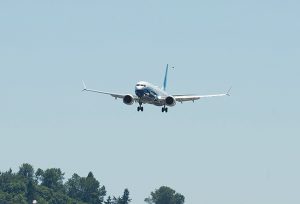Bloomberg
Regulators are taking steps to shield US aviation-industry engineers from the kind of company pressure that was revealed in investigations of the design flaw on the Boeing Co. 737 Max linked to two fatal crashes.
The Federal Aviation Administration on Monday proposed new policies that would shield employees at Boeing and other planemakers who act on behalf of the federal government to review safety, including would-be whistle-blowers.
“New draft guidance calls for manufacturers to monitor, report and investigate all allegations of interference and to report the results to the FAA,†the agency said in a statement. “It also establishes a clear path for these employees to speak freely with FAA certification officials at any time.â€
The proposal addresses one of the most controversial issues to emerge from the Max crashes in 2018 and 2019 that killed 346 people: it was Boeing’s own engineers who approved the final design of the system on the jet that led to the crashes, not FAA employees.
Boeing rose 2.7% to $211.92 by Monday’s trading close in New York amid broad gains by airlines and other aerospace manufacturers.
In a statement, Boeing said that it supports efforts to improve transparency and independence in the arrangement and will work with the agency to ensure those personnel “can perform their vital roles without interference through open communication and a supportive environment.â€
Despite efforts to reform the process of approving aircraft designs, Boeing employees have continued to voice concerns about their ability to raise safety concerns. A survey of the company’s workers last year found 35% raised issues of conflicts of interest and a lack of independence, the FAA reported in August.
The FAA, at times under the direction of Congress, has for decades permitted industry employees known as designees to review aircraft designs.
The agency’s proposal is designed to ensure those employees act as deputized representatives for the government and aren’t subject to any pressures that their careers could suffer if they speak up about safety questions.
A House Transportation and Infrastructure Committee report on the crashes said the system had created conflicts of interest and contributed to a design flaw in the jet.
A bill passed by Congress in December 2020 known as the Aircraft Certification Reform and Accountability Act didn’t eliminate the practice, but included several provisions requiring changes. Additionally, FAA Administrator Steve Dickson has listed the issue as a priority in how the agency responds to the Max crashes.
The issue of pressure on Boeing workers deputized to act on behalf of the FAA has also prompted fines against the company. Boeing agreed to pay $6.6 million a year ago to settle civil allegations that including pressuring its employees.
A safety system on the Max, an updated version of the 737, pushed the jet’s nose down repeatedly in crashes off the coast of Indonesia and in Ethiopia after similar malfunctions. The plane was grounded worldwide for at least 20 months. The system has since been redesigned to prevent such failures.
The public will have 30 days to comment on the proposal.
 The Gulf Time Newspaper One of the finest business newspapers in the UAE brought to you by our professional writers and editors.
The Gulf Time Newspaper One of the finest business newspapers in the UAE brought to you by our professional writers and editors.
